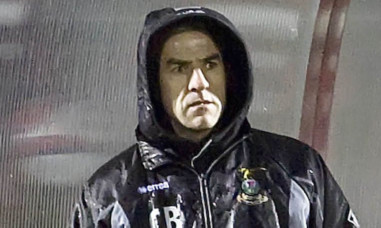
Craig Brewster looks set to miss out on the job of SFA Performance Director.
Similar to his playing days with Celtic, Manchester United and Scotland, it looks like Brian McClair has timed his run for the role with typical efficiency.
48-year-old Brewster isn’t too bothered, however. If life has taught him anything, it is that all things come to those who wait.
Released by Dundee United as a kid, he returned to the club nine years later to score the goal that won the Tangerines the Scottish Cup for the first time in their history.
And if his later spell as manager at Tannadice was dogged by opposition to his insistence on fitness being a priority, modern thinking has proved him to be a man ahead of his time.
Robbie Neilson’s move to put his Hearts players on treble training sessions and six-day weeks has been rewarded with a lead that almost certainly guarantees their promotion to the Premiership.
At Celtic, too, Ronny Deila, a huge advocate of the importance of fitness and diet, has the Hoops on track for their first domestic Treble in 14 years.
Long before Ryan Giggs attracted world-wide praise for playing in the English Premier League as a 40-year-old, Brewster had done so in Scotland’s top flight for Aberdeen and Inverness Caley Thistle.
Now coaching with Brighton in the English Championship, he preaches his gospel to a receptive audience of the Seagulls’ top youth players.
Happy in his work, Brewster nevertheless keeps his himself on stand-by for a return to a more prominent position in the game north or south of the border.
“I was actually about 24 years old before the penny dropped with me,” Brewster admits.
“I’d had six years with Forfar and was a typical part-timer.
“You work hard during the day, go to a couple of training sessions during the week, play on Saturday and then enjoy a couple of pints afterwards.
“My diet wouldn’t have been the worst, and I certainly wasn’t the most unfit guy there.
“But it was when I went to Raith Rovers that everything changed. I met Jimmy Nicholl, and was so impressed by the professionalism with which he approached every aspect of the game.
“In hindsight, I hadn’t really had that kind of role model before in my career.
“I was at Dundee United when I was very young, but they released me because they believed I just didn’t have the kind of pace they were looking for.
“I saw Jimmy, read about the kind of career he’d had in the game, and thought: ‘If I set out to learn from this guy, I can better myself as a player’.
“And that is exactly what I did. I worked really hard at my fitness, concentrated on trying to improve myself on and off the pitch and it paid dividends.
“I started battering in the goals, and through that earned myself a £250,000 move back to Dundee United.
“Ivan Golac was the manager at the time, but I have always believed it was Jim McLean’s decision to sign me.
“Ivan was new and wouldn’t have known about Raith Rovers.
“From there I just kicked on, with our win in the 1994 Scottish Cup Final an obvious highlight.
“That helped get to Greece (his 1996 move to Ionikos was one of the early Bosmans) where I had five great years.
“Over there, I was exposed to a completely different football culture, which helped refine my thinking.
“I brought back quite a few ideas about how I would improve players under my charge, which was very helpful when I went into management.
“It wasn’t rocket science. I just figured that with the game getting quicker and quicker, players who were not at their peak physical condition would increasingly find themselves at a disadvantage against those who were.
“You can be technically more gifted than your opponent. But if he is significantly fitter than you, then you have a potential problem.
“And if that is multiplied throughout the team, then it can make a big, big difference.”
As Brewster admits, his mantra was met with opposition when he returned to manage Dundee United in 2006.
“While I was successful as a player at Tannadice, my time as a boss there was pretty torrid,” he reflects.
“My view was that a lot of changes had to be made across the board, and there was resistance to those changes.
“Where Robbie Neilson has a lot of kids under him at Hearts, all keen as mustard to make their way in the game and, as such, receptive to what he is telling them, I had experienced guys who were not particularly keen on change.
“Things didn’t work out well. The results were poor and we were left scrambling about at the bottom end of the table.
“I did do some things I was proud of, however. Chris Conway, Noel Hunt and Christian Kalvenes were all my signings and they all went on to play in the English Premier League.
“Things take time, though, and in the end I just didn’t have enough of it.”
That, he insists, is not the case just now.
“If (as is expected) Brian gets the SFA Performance Director job, then fair play to him,” says Brewster.
“He is a good guy, with good experience from his time with Manchester United’s Academy.
“From my point of view, the important thing is that contact was made. When the job became available, I thought: ‘Why not?’ and the SFA heard me out.
“So we are where we are. As I said, I love with working with the kids at Brighton, but I am still ambitious and the future might hold a few surprises yet.”

Enjoy the convenience of having The Sunday Post delivered as a digital ePaper straight to your smartphone, tablet or computer.
Subscribe for only £5.49 a month and enjoy all the benefits of the printed paper as a digital replica.
Subscribe